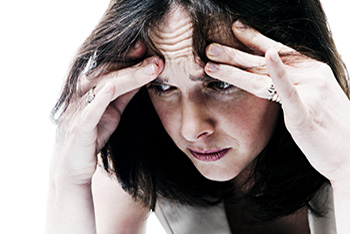Anxiety
When you are anxious you feel fearful and tense. In addition you may also have one or more of the following physical symptoms:
- A fast heart rate.
- Palpitations.
- Feeling sick.
- Shaking (tremor).
- Sweating.
- Dry mouth.
- Chest pain.
- Headaches.
- Fast breathing.

General Anxiety is a normal physiological reaction to ordinary life events and in certain situations can even be helpful. For example, most people will be anxious when threatened by an aggressive person, or before an important race. This mobilises a burst of adrenaline and nerve impulses which initiates the ‘fight or flight response’. Some people are more prone to ‘normal’ anxieties. For example, some people are more anxious before exams than others.
Anxiety can be considered ‘abnormal’ if it:
- Is out of proportion to the stressful situation, or
- Persists when a stressful situation has gone, or the stress is minor, or
- Appears for no apparent reason when there is no stressful situation.
If you experience generalised anxiety you feel fearful, worried and tense on most days and across different situations; you will usually experience some of the following symptoms:
- Feeling restless, on edge, irritable, muscle tension, or ‘keyed up’ a lot of the time.
- Tire easily.
- Experience difficulties concentrating and on occasions your mind may ‘go blank.’
- Poor sleep (insomnia).
If your anxiety is about one specific thing you do not have General Anxiety Disorder (GAD). For example, if your anxiety is elicited by fear of one thing in particular then you are more likely to have a phobia.
Various factors contribute to GAD:
- Your genetic makeup.
- Childhood traumas.
- A major stress or cumulative stress.
Without treatment, GAD can become pervasive. It is relatively mild in some cases, but for some it can be very disabling. Treatment can help to ease symptoms, and can improve your quality of life. There is no ‘quick fix’ however, anxiety is not an “illness” and is often triggered by feeling out of control and a useful tip is the 90;10 rule. For the ten percent of life events which are outside of our control, 90 percent of the time we can control our response which can turn anxiety levels up or down. Other treatment options include:
- Talking treatments and other non-drug treatments.
- Cognitive therapy.
- Anxiety management courses.
- Self help (leaflets, books, tapes, videos, etc, on relaxation and combating stress).
- Medication.
- Mindfulness or other relaxation techniques
- A combination of treatments above.